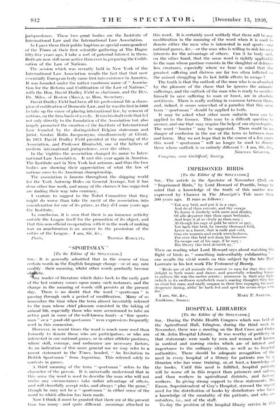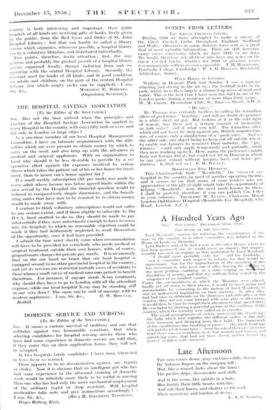HOSPITAL LIBRARIES [To the Editor of the SPECTATOR.] SIR ,—During
the Public Health Congress which was held at the Agricultural Hall, Islington, during the third week in November, there was a meeting on the Red Cross and Order of St. John Hospital Library. It was worthy of publicity in that statements were made by men and women well known in medical and nursing circles which arc of interest and importance to the ordinary citizen, as well as to hospital authorities. There should be adequate recognition of the need in every hospital of a library for patients run by a librarian who has some training, or, at least, a knowledge of the books. Until this need is fulfilled, hospital patients will be worse off in this respect than prisoners and sailors, and than workers in agricultural districts, and factory workers. In giving strong support to these statements. Mr. Eason, Superintendent of Guy's Hospital, stressed the urgent need for the distribution of books by distributors who baNe a knowledge of the mentality of the patients, and who ;ITC
outsiders, i.e., not of the staff. To-day the Position of the hospital libraiy service in this
country is both interesting and important. Over 2,000 hospitals of all kinds are receiving gifts of books, freely given by the public, from the Red Cross and Order of St. John Hospital Library ; but that can hardly be called a library service which organizes, whenever possible, a hospital library ran by a voluntary librarian, and distributed individually.
Two points, therefore, invite attention ; first, the sug- gestion, and probably the gradual growth of a hospital library service organized locally, though radiating from and co- operating with the central Hospital Library. Secondly, the constant need for books of all kinds, and in good condition, for adults and children, on the part of the central Hospital Library (for which empty sacks can be supplied).— I am,
(Organizing Secretary).















































 Previous page
Previous page